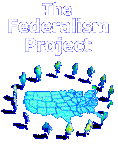|
|
Can States Restrict what
Judicial Candidates Say on the Campaign Trail? In 1997, Minneapolis lawyer Gregg Wersal campaigned for a seat on Minnesota's Supreme Court, boasting, among other things, of his fondness of Republican Party principles and strict legal constructionism. Problem: under the state's Code of Judicial Conduct, candidates for the bench can not announce their views on "disputed legal issues" or solicit support from political parties. After coming in third in the primaries, the would-be judge consoled himself with a suit against state's Board of Judicial Standards, contending that the Code contravenes his right to free speech and association, guaranteed by the First and Fourteenth Amendments. The 8th Circuit disagreed. Minnesota has plenty of compelling reasons to regulate campaign speech and action in judicial elections (eg avoid corruption on the bench, promote public confidence). Since the state's rule is narrowly tailored, it passes constitutional muster. (Click here for the full opinion.) The Supreme Court took up the Code's speech restriction on "disputed legal issues" and struck down its prohibition on party activity. True to form, the "federalist" justices have downplayed the usefulness of state regulation for the cause of political expression. (Recall, please, Justice Thomas' rousing defense of political speech in Nixon v Shrink: "In my view, the Constitution leaves it entirely up to citizens and candidates to determine who shall speak, the means they will use, and the amount of speech sufficient to inform and persuade.") |
||||||||||||||

